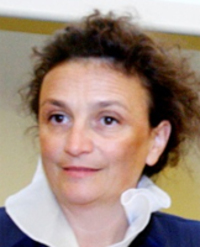Speaker: Vessela N. Kristensen
Title: Systems medicine vs systems biology: HEURstic models for clinical dEcision in breast Cancer (HEURECA)
Abstract: We aim to translate Systems Biology approaches into medical research and practice. In the era of “precision revolution”, moving from crowd based, best-for-all treatments towards patient tumor-tailored medicine, a clear clinical need is to identify amongst the enormous amount and variety of molecular markers generated by systems biology those that should be added to the current set of clinical predictors to improve diagnosis, prognosis and treatment response. Scale-free rank-based Bayesian meta analysis methodology as well as computational and mathematical micro-scale cancer models will be applied.
Prior biological knowledge will be crucial in restricting the model space: Structures will be based on broad biological knowledge of interactions between different data types derived from our current studies, and Bayesian priors will utilise experimental and text-mining evidence (representing unsupervised knowledge). This information will be then used to develop informative priors, which will be introduced in a hierarchical Bayes analysis of the -omics data. Creating algorithms that include available genome-scale tumor molecular data simultaneously generated from each tumor, by DNA sequencing, mRNA and miRNA expression profiling, DNA copy number alteration (CNA)and methylation data, we envision to provide a “barcode” vector of the disease of each individual patient, which will enhance clinical decision-making.
We have generated all the molecular data from both discovery and very well clinically characterised validation datasets for a Proof of Concept. We will be delivering reliable and powerful analytical and simulation results to refine the experimental design for future prospective clinical data. Our mathematical/computational models will lead to better understanding of the biological processes which play a fundamental role in complex disease processes the key common underlying mechanisms in disease, which will enable clinical decision.
Biography:
Vessela N. Kristensen is a Professor I at the Medical Faculty of the University in Oslo (UiO) in Clinical Epidemiology at the Department of Clinical Molecular Biology and Lab science (EpiGen), Akershus university hospital, and Group Leader at the Department of Genetics, IKF, Det Norske Radiumhospital. She has been also Professor II at the Centre for Integrative Genetics, University of Life Sciences, Ås and assistant professor at the Advanced Technology Center led by professor Stephen Chanock at NCI, NIH, Bethesda. Kristensen has visited the Berzelius Laboratory at Karolinska to work on the functional characterization of polymorphic CYP2E1 together with the group of professor Magnus Ingelman Sundberg. She was also granted a fellowship to study the aromatase (CYP19) in the lab of dr. N. Harada at Fujita Health University, Nagoya, Japan.

